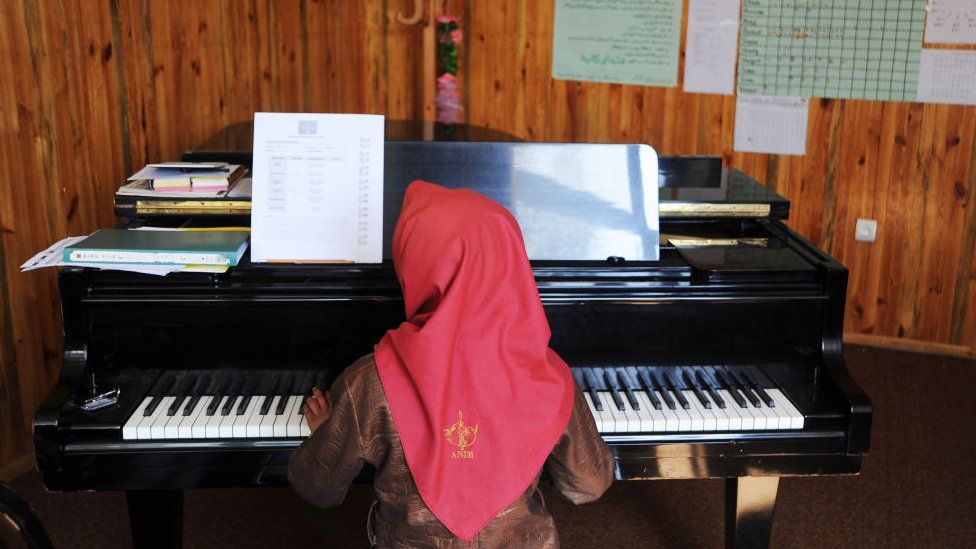Imagine being afraid for your safety because you have been learning to play the piano or sitar.
This is what students and staff at the Afghanistan National Institute of Music (ANIM) are now facing, after the Taliban said they would ban music following their takeover of the country. The doors of the celebrated school are closed, and its hallways have fallen silent.
"The students are all fearful and concerned. They clearly understand that if they return to the school, they might face consequences or be punished for what they've been doing," the school's founder and director, Dr Ahmad Sarmast, told the BBC.
He said some students had returned their instruments to the school when the Taliban descended on the city. This was deemed safer than keeping them at home, where fighters from the Islamist group might find them.
The school in the capital, Kabul, has thrived under Dr Sarmast's leadership for more than a decade, and he has been praised for bringing music back to its classrooms after strict Taliban rule between 1996 and 2001.
ANIM was a trailblazer: boys and girls were taught in the same room - a rarity in Afghanistan - and they practiced both Afghan and Western classical music. Orphans and street children were encouraged to attend, and many graduates were the first in their family to receive a formal education.
The school was also home to Zohra, Afghanistan's first all-female orchestra, which performed to huge audiences both nationally and internationally.
It soon became a symbol of Afghanistan's new identity, with equality and education for all.
But now history has repeated itself. Afghanistan is back under Taliban control, and the future of the school and its musicians is uncertain.
"It is a time of devastation of our dreams, of hope, of inspiration for the future," Dr Sarmast said, speaking from Melbourne, Australia, where he has been visiting family since mid-July.
He was forced to watch on in horror as the Taliban took control of Afghanistan with lightning speed earlier this month. As they seized Kabul, Dr Sarmast knew his staff and students may be targeted by the militants and ordered everyone to go home.
"The students are very fearful about their future - not just of their education and their [music] programme, but also about their life," he said. "They do not feel safe in Afghanistan."
Some staff have been keeping an eye on the school from afar, providing Dr Sarmast with regular updates. They told him the campus has been overrun by Taliban fighters but not damaged. It later emerged that images shared on social media purporting to show instruments being destroyed were fake.
The Taliban have been looking for Dr Sarmast, who is internationally recognised and respected for his educational work in Afghanistan. Faculty staff told him militants at the campus have asked where he is and visited his Kabul home three times.
Taliban fighters have also tried to pressure his staff to come to the school and hand over the keys. Dr Sarmast, however, insists he will only negotiate and communicate with senior Taliban leaders.
How strict or wide-reaching the music ban will be is yet to be seen, but there are fears the country will revert back to 1996 when the Taliban outlawed most music. There were harsh punishments for those caught playing or listening to music, instruments were destroyed, musicians went into hiding and cassette tapes were strung up on trees.
The Taliban has said that its new government will be more modern and less extremist this time around - promising freedom for women and safety for government workers. However, its leaders haven't elaborated on what that means in practice, and there have been a number of instances when those messages were not consistent with the behaviour of Taliban militants on the ground.
"It seems naive, but I'm still hopeful that the Taliban might learn from the past," Dr Sarmast said. "But this hopefulness of mine is getting shaky when I see what's happening on the ground in Kabul."
Dr Sarmast fled Afghanistan during the Civil War in the 1990s, living in Moscow for 10 years and then Australia where he became the first Afghan to complete a PhD in music.
Returning to Afghanistan after many years in exile, he was determined to help rebuild its centuries-old music traditions. A suicide bomb attack in 2014 that left him badly injured and temporarily deaf only made him more determined.
He believes that the five years the Taliban were in power was long enough to lose some of that musical heritage, especially in younger generations. Now, after rebuilding those skills and knowledge in a new generation - they risk being lost all over again.
Dr Sarmast has inadvertently become part of Afghanistan's so-called "brain drain" - the exodus of the country's most educated people as they flee the Taliban.
"I'll only be returning if I'll be allowed to do what I've been doing for the last 13 years, and put my knowledge, skills and abilities into the service of the children and youth of Afghanistan," he explained, his voice breaking with emotion.
As ANIM's staff and students wait to hear what's next, Dr Sarmast said they should continue to pursue music: "To my fellow Afghan musicians - do not give up your voices. Sing, play, continue to do what you've been doing.
"And to the international music community - stand in solidarity with the music and musicians of Afghanistan."

